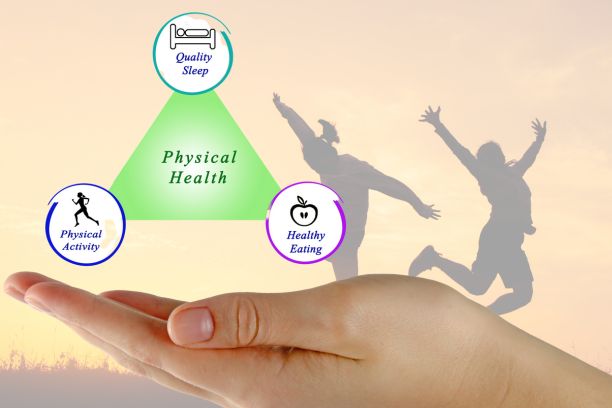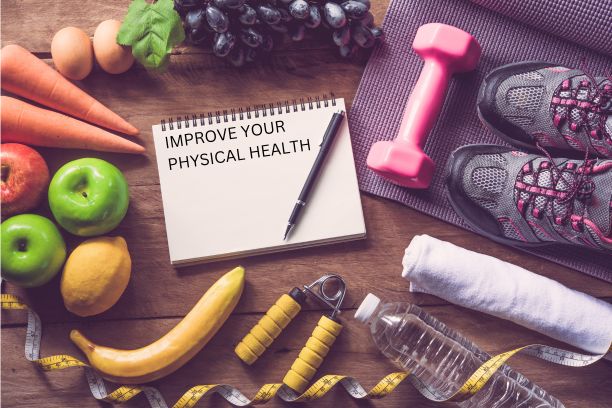10 Ways to Improve Your Physical Health
To improve your physical health, it requires more than just an occasional trip to the gym or a fleeting attempt at eating healthy.
It’s about cultivating daily habits that nourish, energise, and sustain you.
This blog aims to guide you through practical strategies to enhance your physical health and wellbeing.
Contents
10 Ways to Improve Your Physical Health
Video on 4 ways to Supercharge Your Health
How Does Regular Exercise Improve Physical Health?
How Does a Balanced Diet Improve Your Physical Health?
How Does Staying Hydrated Improve Physical Health?
How Does Good Quality Sleep Improve Your Physical Health?
How Does Stress Management Play a Role in Improving Physical Health?

10 Ways to Improve Your Physical Health
1. Stay Active
Physical activity is the secret sauce to maintaining and improving your overall health.
Engaging in regular exercise can work wonders, from burning calories to enhancing your mood, and boosting brain function.
It contributes to improved heart health, better sleep, increased energy levels, and decreased risk for chronic diseases.
The beauty of exercise is that it doesn’t need to be overly complex or intense.
How to get started: Start with simple activities.
Aim for 15 minutes of moderate-intensity activity a few times a week.
Start with something simple like walking.
As you build stamina, gradually incorporate more rigorous activities such as weight lifting, high-intensity interval training, or sports.
Dabble in different fitness activities – from yoga classes to hiking trails – to discover what you enjoy.
The key is to make exercise enjoyable, turning it into a regular habit rather than a chore. Consistency is vital in reaping the benefits of physical activity.

2. Eat a Balanced Diet
Feeding your body with the right nutrients is essential for good health.
A balanced diet ensures that your body gets a variety of nutrients it needs to function optimally.
Eating a range of fruits, vegetables, lean proteins, and healthy fats can reduce your risk of chronic diseases, improve longevity, and enhance your mood and energy levels.
How to get started: Begin with educating yourself about different food groups and their nutritional value.
Aim to balance your meals by including portions from each food group.
Contrary to popular belief, a balanced diet doesn’t mean completely eliminating ‘bad’ foods.
It’s about practicing moderation. Indulge in your favourite treats occasionally, but make sure that most of your dietary choices are nutrient-dense.
Meal planning and preparation can go a long way in maintaining a balanced diet.
It allows you to control ingredients, portion sizes, and ensures you always have a healthy meal on hand.
3. Stay Hydrated
Staying well-hydrated is an essential part of good health.
Water plays a key role in your body’s vital functions, from the digestion and absorption of nutrients to maintaining your body’s temperature and flushing out waste and toxins.
Additionally, it contributes to mental clarity, healthy skin, and aids in weight management.
Dehydration can lead to headaches, fatigue, dry skin, and in severe cases, heat stroke.
How to get started: Start with the general recommendation of 2 litres of water per day.
However, remember that your needs can vary based on your physical activity level, age, and other factors.
Make it a habit to carry a water bottle with you wherever you go.
If you find plain water unappealing, you can enhance its flavour by infusing it with a lemon, lime, or other fruit.

4. Get Adequate Sleep
Adequate, quality sleep is a cornerstone of health that’s as important as nutritious food and regular exercise.
Good sleep enhances mood, boosts the immune system, sharpens brain function, and can even help control weight.
Chronic lack of sleep can lead to serious health conditions like heart disease, obesity, and diabetes, and negatively impact mental health.
How to get started: Prioritise sleep by setting a regular sleep schedule, aiming for 7-9 hours each night, and try to stick to it, even on weekends.
Ensure your sleeping environment is conducive to good sleep: dark, quiet, and cool.
Establish relaxing bedtime routines like reading a book, listening to calming music, or taking a warm bath.
Limit exposure to screens before bedtime as the blue light emitted can interfere with your sleep cycle.
If you struggle with sleep, consider seeking professional advice.

5. Limit Alcohol and Avoid Smoking
Limiting alcohol and avoiding smoking are critical steps towards better health.
Excessive alcohol can lead to liver damage, certain cancers, and can negatively impact mental health.
Smoking increases the risk of various diseases, including lung cancer and heart disease.
How to get started: If you choose to drink alcohol, do so in moderation.
Aim to drink less than weekly recommendation of 14 units.
For smoking, the best choice is to quit completely.
Reach out to health professionals or local support groups to help with the quitting process, which can be challenging but immensely beneficial to your health.

6. Regular Health Check-ups
Regular health check-ups are key to preventing diseases and catching potential issues early.
They can provide a comprehensive overview of your current health status and help you make informed decisions.
How to get started: Schedule regular visits with your primary care physician.
This should include standard blood tests, blood pressure monitoring, and other preventative screenings as recommended based on your age, sex, and family history.
Proactive engagement with your health is far better than reactive healthcare.

7. Manage Stress
Chronic stress can wreak havoc on your body and mind.
It can lead to various health issues, such as heart disease, diabetes, anxiety, and depression.
Learning how to effectively manage stress can improve your overall wellbeing and boost your physical health.
How to get started: Incorporate stress-management techniques into your daily routine.
This could include meditation, yoga, deep breathing exercises, or simply taking time out for hobbies and activities you enjoy.
Regular physical activity and maintaining a healthy diet can also help manage stress levels.
If your job is the main cause for your stress, ask your company to host wellbeing workshops that help cope with stress and support your wellbeing.
If you feel overwhelmed, consider seeking professional help.

8. Maintain a Healthy Weight
Maintaining a healthy weight is crucial for your overall health.
Being overweight or obese can lead to various health issues, such as heart disease, diabetes, and certain cancers.
A healthy weight can increase longevity, improve your energy levels, and enhance your overall quality of life.
How to get started: Achieving and maintaining a healthy weight involves a combination of balanced nutrition and regular physical activity.
Seek professional help if necessary.
A dietitian can provide personalised advice on healthy eating habits, and a fitness trainer can create an exercise plan that suits your needs and preferences.
9. Prioritise Mental Health
Physical health is tightly linked with mental health.
Chronic stress, anxiety, and depression can not only decrease your quality of life but also lead to physical health problems such as heart disease, high blood pressure, and a weakened immune system.
How to get started: Practice mindfulness and relaxation exercises, like meditation or yoga, to alleviate stress and promote mental wellbeing.
Connect with others.
Social interactions can greatly improve your mood and outlook.
Don’t hesitate to seek professional help if you’re feeling overwhelmed.
Therapists and mental health professionals can provide strategies and treatments to improve your mental health, which in turn, will positively impact your physical health.

10. Get Regular Sunlight
Sunlight is a natural source of vitamin D, which is essential for many body functions, including maintaining healthy bones and teeth, supporting the immune system, and aiding in the absorption of calcium and phosphorus.
Even when it’s cloudy, the sun can still send out special light (called UV rays) that helps our body make vitamin D.
How to get started: Aim for 10 to 30 minutes of sunlight, several times per week.
The exact time will depend on your skin type, location, and the time of year.
Always remember to protect your skin with sunscreen if you plan on being outside for extended periods to reduce the risk of skin damage and skin cancer.

4 Ways to Supercharge Your Health
How Does Regular Exercise Improve Physical Health?
Engaging in regular physical activity is one of the most effective ways to enhance your physical wellbeing.
But how exactly does it work?
Regular exercise can boost your heart health, making your cardiovascular system more efficient at pumping blood and delivering oxygen to your cells.
It can help you maintain a healthy weight by increasing your metabolism and helping you burn more calories.
Regular exercise also builds and maintains healthy muscles and bones, reducing the risk of osteoporosis and fractures.
On top of all this, it can release endorphins, natural mood-lifters that can keep stress and depression at bay.
In short, Regular exercise is like a health-boosting multivitamin for your body!
Whether it’s a brisk walk, a yoga class, or a vigorous workout, make sure to incorporate some form of physical activity into your daily routine.
Start small, be consistent, and watch your physical health soar!

How Does a Balanced Diet Improve Your Physical Health?
Eating a balanced diet is a key component of physical health.
It’s like filling your car with premium fuel; your body simply performs better when supplied with high-quality nutrients.
Different foods supply different nutrients and benefits.
Consuming a variety of foods from all food groups ensures you get a range of vital nutrients.
Fruits and vegetables are packed with vitamins and antioxidants that boost your immune system and combat disease-causing toxins.
Protein-rich foods like lean meat, fish, and legumes are essential for muscle repair and building, while whole grains and starchy vegetables provide energy-rich carbohydrates.
Healthy fats, like those found in avocados and oily fish, support cell growth and hormone regulation.
By meeting your nutritional needs, a balanced diet supports numerous bodily functions, making you feel stronger, more energised, and enhancing your overall physical health.
Moreover, eating balanced meals helps in maintaining a healthy weight by providing satiety and preventing overeating.
How Does Staying Hydrated Improve Physical Health?
Hydration is akin to oil in a machine.
It ensures everything runs smoothly and efficiently.
Staying hydrated has an astounding number of benefits that play a critical role in maintaining and improving your physical health.
Water is involved in nearly every bodily function.
It regulates body temperature, lubricates joints, aids digestion, and enables the body to absorb nutrients.
It also helps to transport oxygen and other essential nutrients to your cells, aiding in the overall function of your organs.
Moreover, it’s vital for flushing out toxins and waste products from your body, thus keeping your system clean and functioning optimally.
Staying well-hydrated also contributes to cognitive functioning and mood, impacting mental wellbeing, which in turn influences physical health.
It aids in maintaining healthy skin, preventing dryness, and promoting a youthful appearance.
Furthermore, it assists in weight management by promoting feelings of fullness and boosting metabolism.

How Does Good Quality Sleep Improve Your Physical Health?
Good quality sleep is like pressing the reset button on your body every day.
It’s during this restorative period that your body performs vital functions that directly contribute to your physical health.
During sleep, your body heals and regenerates tissues and cells.
This process is crucial for maintaining heart and blood vessel health, repairing muscles post-workout, and supporting growth and development in children and teens.
The immune system also relies on adequate sleep to function optimally and fend off diseases.
In addition, quality sleep plays a pivotal role in maintaining a healthy balance of the hormones that regulate hunger (ghrelin and leptin), thus aiding in weight management.
Additionally, it helps control insulin, the hormone responsible for regulating blood sugar levels.
How Does Stress Management Play a Role in Improving Physical Health?
Stress is a part of life. It can be a powerful motivator, but when it becomes chronic, it can have a significant negative impact on your physical health.
Managing stress effectively is thus crucial for maintaining and improving your health.
Chronic stress can wreak havoc on your body.
It can cause or exacerbate a host of physical health problems such as heart disease, high blood pressure, diabetes, and other illnesses.
It can also lead to issues like headaches, upset stomach, and sleep disturbances.
When you’re under stress, your body releases the hormone cortisol.
While beneficial in short bursts, prolonged elevated levels can disrupt various body processes, leading to inflammation, decreased immune response, and an increased risk of chronic diseases.
By managing stress effectively, you can reduce these health risks.
Stress management techniques like meditation, deep breathing, yoga, and other relaxation practices can lower cortisol levels and promote the release of endorphins, your body’s natural painkillers and mood elevators.
Regular physical activity and a healthy diet also play key roles in managing stress and improving physical health.

Improving your physical health isn’t about quick fixes or drastic changes.
It’s about the incremental adjustments you make each day, the small habits you cultivate, that collectively contribute to a stronger, healthier you.
From moving your body regularly to nourishing it with wholesome foods, from ensuring you’re well-hydrated to prioritising restful sleep and managing stress, each step you take is a victory for your health.
Remember, every journey starts with a single step, and it’s never too late to start. Here’s to embracing the journey and celebrating every step you take towards better physical health!
If you’d like help setting habits, check out or blog “4 steps to create life-changing habits“
Author –
Tyler Lowe – Health & Wellbeing Speaker
BSc Sport & Exercise Rehabilitation


